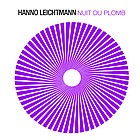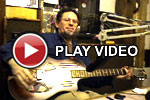Hanno Leichtmann, "Nuit Du Plomb"
 Music that was made to illustrate a slide lecture on Hans Henny Jahnn's novel The Night of Lead, a tale of alienation and sado-masochism which was greeted with revulsion and largely forgotten. This is the first release under his own name by Hanno Leichtmann, though fans of his work with Static and Pole can listen without too much trepidation.
Music that was made to illustrate a slide lecture on Hans Henny Jahnn's novel The Night of Lead, a tale of alienation and sado-masochism which was greeted with revulsion and largely forgotten. This is the first release under his own name by Hanno Leichtmann, though fans of his work with Static and Pole can listen without too much trepidation.
Anyone familiar with Jahnn's images of (what was then assumed to be) sexual-pathology and the broader themes of his work—such as in the trilogy, Fluss ohne Ufer, which explores the dangers of delving into the secrets of creation—may find Leichtmann's accompanying music surprisingly muted. Perhaps the idea was to create contrasting sadness and quasi-melody as, apart from one horrendously overly-poppy track, there is nothing sounding remotely offensive, repulsive or even mildly irritating. Those of us who approach the record without knowledge of the book or the slides may find that it swells with gradual and affecting motion, successfully balances chill and warm electronics, enjoying a clever ratio of space, tension, rhythm and release.
Opening track "Anfang" is briefly reprised by the final one, "Abspann," for a top-and-tailed effect that is as Elizabethan as it is suggestive of life's circularity or inevitability. I wondered if "Wind" referenced the dusty silent film or meant some cranking motion, before deciding that it really didn't affect my enjoyment one way or the other. Everything progresses in a pleasantly unfussy, lonely and downtempo manner until about 18 seconds into "Elvira" when things veer into an innocuously synthetic cul de sac of horrid blandness, almost threatening the entire introspective journey. A few minutes of silence or dental drilling would have preferable. The record's peak is "Keller" which sounds like a throbbing life-support system encased in ice, a hopeful blip heard through dark space, or a forlorn vessel pushing perilously through fog—a lighthouse winking out of view. Brilliant.
Jahnn also published 17th-century organ music and gained an international reputation as a builder and renovator of organs. The church organ can be the most dogmatic and undemocratic of instruments, so this aspect of his life is of no interest to me. Actually, since there appears to be little happening on this record, it's a slight puzzle as to why I keep playing and mostly enjoying it. Perhaps because, according to listener mood, Nuit Du Plomb is both nothing much at all, and conversely, a splendid aching sigh of a record. Certainly, a desire to both read the book, and see the lecture, has been kindled. Until then, in my slideshow: A cricketer leaves the crease. Tears are wiped away unseen. Icecaps dissolve and fall. A ship is bound for where? Cities decay. Someone gives themself away too easily. Clocks never stop. A man regrets what he did to a friend. Leaves fall and become sodden. Tea goes cold and cakes burn. Machines lose their will to go on, but go on. Ho, and indeed, hum.
samples:



